AUCTORES
Globalize your Research
Research Article
*Corresponding Author: Hanan Elzeblawy Hassan, Maternal and Newborn Health Nursing, Faculty of Nursing, Beni-Suef University, Egypt.
Citation: Fatima Hosny Abd-ELhakam, Rasha El-Syed Ebrahim, Momen Zakria Mohammed and Hanan Elzeblawy Hassan, (2022), Relationship between Socio Demographic Data and Female Genital Mutilation. Archives of Medical Case Reports and Case Study, 6(5); DOI:10.31579/2692-9392/160
Copyright: © 2022, Hanan Elzeblawy Hassan. This is an open access article distributed under the Creative Commons Attribution License, which permits unrestricted use, distribution, and reproduction in any medium, provided the original work is properly cited.
Received: 25 November 2022 | Accepted: 12 December 2022 | Published: 22 December 2022
Keywords: relationship; socio demographic data; female genital mutilation
Background: The World Health Organization and the United Nations Children's Fund and the United Nations Population Fund released the first joint statement directly addressing Fmale Genital Mutilation.
Aim: Assess Relationship between Socio Demographic Data and Female Genital Mutilation at Beni-Suef. Subject & Methods: A descriptive cross-sectional study was used. The study population consisted of 2837 females in family health centers (FHCs) in different sitting at Beni-Suef. Α Structured Interviewing Questionnaire sheet was used to collect data.
Results: The mean age of the studied participants was 22.6±5. The prevalence of FGM/C was 71.4%. Significant associations between FGM/C and participants' residence, level of education, marital status, religion, and parents' education (p≤0.001) were found.
Conclusion & Recommendations: There is an association between socio demographic data and Female Genital Mutilation at Beni-Suef. Development of an educational program for rural dwellers about FGM is required to increase their awareness.
Female genital mutilation (FGM/C) is a crucial global issue of interest attracting policy-makers attention attributed to its direct effect on women's health and representing a particular of gender-based violence (Sabry, et al., 2020). Over the past decades, the problem of FGM, which previously was referred to as female circumcision, has attracted the eye of researchers because it is one of the worst sorts of violations against females (Joseph, 2014).
The World Health Organization (WHO) and the United Nations Children's Fund (UNICEF) and the United Nations Population Fund released the first joint statement directly addressing FGM/C in 1997. (UNFPA, 2019). Since then, the international response has picked up speed (McCauley, 2019).
Although the procedure is known as clitoridectomy in the nations where it is performed, its unpleasant physical and psychological ramifications have led to the use of the Latin term "mutylatio" in medical literature, which means "to maim, to chop off (mutilation)."(Birge, et al., 2019). The term female circumcision should be avoided since it draws a parallel with male circumcision and, as a result, creates confusion between these two distinct practices (UNICEF, 2016).
In the Arab world, FGM/C may be a contentious topic, and there's no consensus on whether it's an Islamic requirement or an ethnic tradition. However, the influential Egyptian Muslim institution Dar Al-Ifta Al- Misriyyah recently confirmed during a press statement that FGM/C is religiously forbidden as a result of its negative impact on physical and mental well-being. Sheikh of Al-Azhar reconsiders unreliable fatwas released by some members of the school of Al-Azhar University (Egypt) who claim FGM/C may be a religious necessity supported by weak Hadith (Prophet Mohammad‟s teachings) through the subsequent statement: “This act has no religious origin; it only dates back to inherited traditions and customs and therefore the biggest evidence for not being a religious duty for girls is that the Prophet Muhammad had not circumcised his daughters.” Nevertheless, this practice is widely prevalent in many Muslim countries, especially Sudan, Iran, and Egypt (Al Awar, et al., 2020).
The present study was carried find out about FGM in Beni-Suef Governorate through:
2.1. Research Questions
3.1. Research Design: A Descriptive Cross-sectional study was used
3.2. Subjects & Setting:
3.2.1. Setting: The family health centers (FHCs) in different sitting at Beni-Suef Governorate.
3.2.2. Sample:
3.2.2.1. Sample Type:
A Convenient sample was used. The study sample was selected according to the following Inclusion criteria: 18-60 years old women. Can read and writes
3.2.2.2. Sample size:
The study population consisted of all circumcised females (2837) who were accepted to participate in the study at the time of data collection (A period of six months from the start of data collection) and will be included in the study.
3.2.3. Tools of Data Collection:
A pre-designed structured questionnaire was used to collect data. Data were collected through personal interviews. The questionnaire is divided into three sections:
Section I: А Structured Interviewing Questionnaire sheet which includes the following parts: age, residence, level of education, marital status, occupation and experience with mutilation, etc……
Section II: Prevalence of Female Genital Mutilation (FGM/C) among total participant women
Section III: Relationship between Socio Demographic Data and Female Genital Mutilation among studied participants
3.2.4. Validity of the Tool
Five experts reviewed the content validity of the tool from maternity and gynecological nursing professors, obstetric and gynecological medical professors and mental health nursing professors.
3.2.5. Ethical Considerations & Administrative Considerations:
Researchers took approval from settings directors before starting the research in order to allow them to take the survey sample. Written letters, including the aim of the study was issued from the dean of the faculty of nursing, Beni-Suef University, to the directorate of the MCH centers in Beni-Suef city to obtain permission to collect the research sample from MCHs under their directorate. Consent from every woman before the beginning of the interview was taken. Explanation of the study's aim was done for women to gain their permission to participate. Every woman participating in the study was assured clearly about confidentiality of the information gathered, and its use only for this study.
3.2.6. Pilot study
It is approximately 10% of the study sample. Woman's abilities to participate in filling questionnaire were assessed. The pilot settings, selected in this study were inclusive in the original study subject, but the pilot sample was excluded from the main one in order to avoid contamination of the study sample. The pilot study assessed clarity of language, applicability of items, and time consumed for filling in the tools' items. According to the results of the pilot study, modifications were made on the questionnaires.
3.2.7 Field Work
Data were gathered over six months beginning in November 2021 and ending in April 2022. The researcher was present at the previously mentioned location until the entire sample size was gathered. Before data collection, the researcher introduced herself to the women and explained the purpose of the study.
3.2.8. Statistical Analysis
All data were collected, tabulated and statistically analyzed using IBM SPSS 25. Data was supplied, and appropriate analysis was performed for each parameter based on the type of data obtained.
3.2.8.1. Descriptive Statistics data were expressed as:
3.2.8.2. Analytical Statistics:
3.2.8.3. Graphical presentation:
Table (1) showed that the mean age of the studied participants was 22.6±5, most of them were rural residents (70.4%), 90.2% were highly educated, 57.5% were single, 96.8% were Muslims, and most of their mothers were educated (72.8%), and most of their fathers were educated (83.2%). About two-thirds of the participants were a student (65.4%).
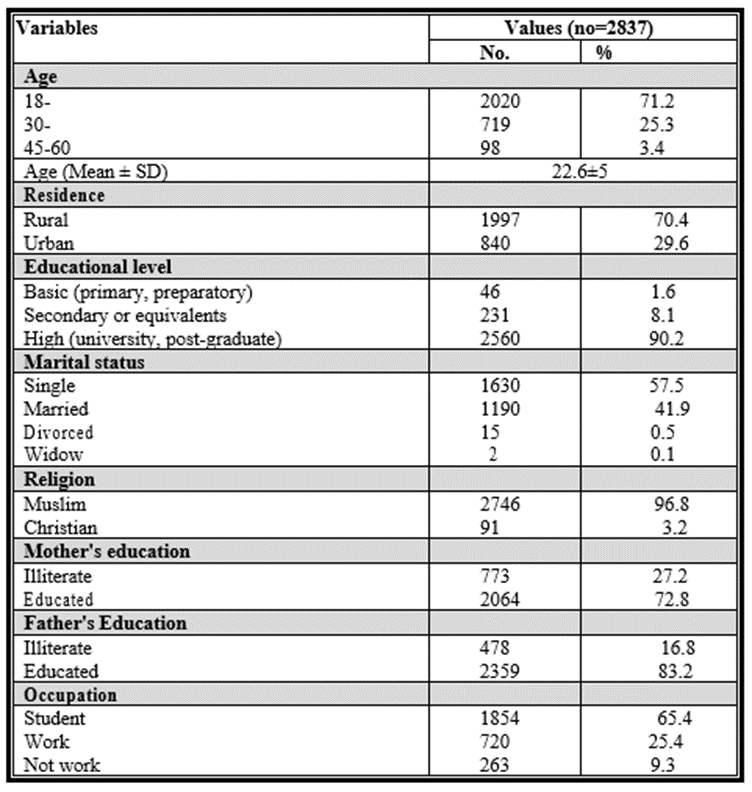
Table 1: Socio-Demographic & Personal Characteristics of the Studied Participants
Figure (1) showed that the prevalence of FGM/C among total participants (2837) at Beni-Suef was 71.4%.
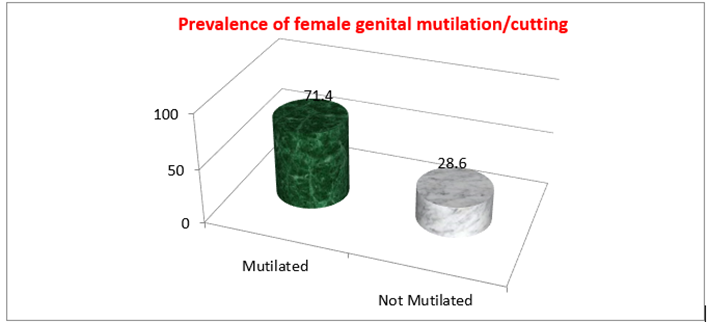
Figure 1: Prevalence of female genital mutilation/cutting.
Figure (2): presented the relationship between residence of studied participants and circumcision. It showed that there was a significant association between FGM/C and participants' residence (p≤0.001). Circumcision were more prevalent (81.3%) among rural dwellers than urban (18.7%) ones.
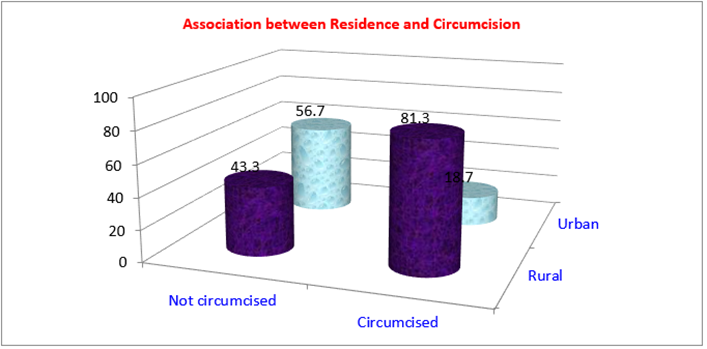
Figure 3: Association between Educational level of studied participants and Circumcision
VFigure (4): presented the relationship between marital status of studied participants and circumcision. It presented that there was a significant association between marital status and circumcision(p≤0.001). Circumcision was more prevalent (54.9%) among single females than other ones.
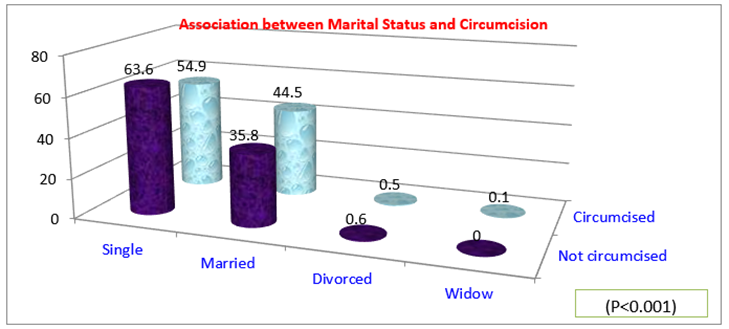
Figure 4: Association between Marital Status of studied participants and Circumcision
Figure (5): presented the relationship between religion of studied participants and circumcision. It showed that there was No significant association between religion and circumcision (p>0.05)
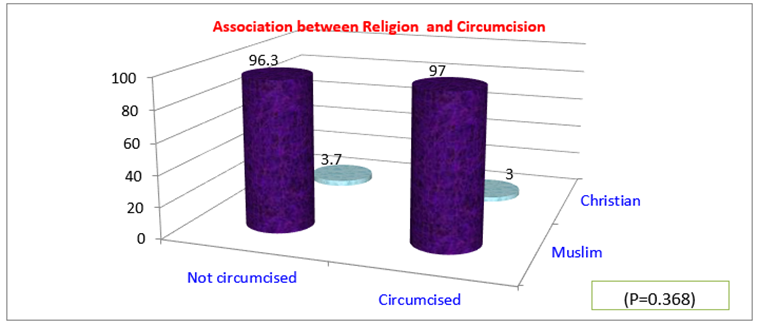
Figure 5: Association between Religion of studied participants and Circumcision
Figure (6): presented the relationship between parents' education and circumcision. It showed that there was a significant association between mothers' education and circumcision (p≤0.001). Non circumcised participants were more prevalent (82.2%) among those whose mothers were educated than illiterate ones (17.8%).
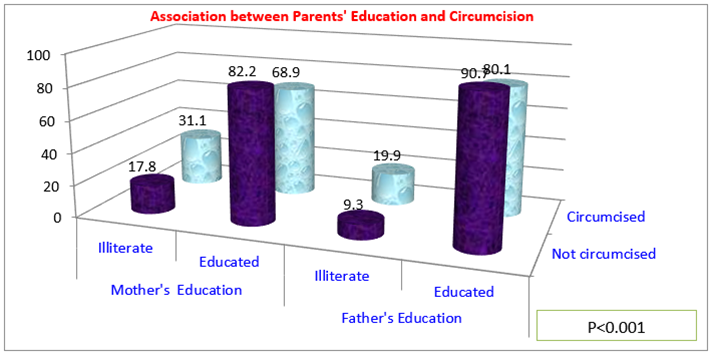
Figure 6: Association between Parents'' Education and Circumcision.
There is no concrete evidence of where FGM was first beginning to be practiced, but some studies suggest it'd are first started in ancient Egypt and then spread to different parts of the world at different times (Abdelhafeez, et al.,2020).
In the current study, the mean age at the time of mutilation was 12.5±2.5 years. The minority of those who had been mutilated was over 15 years, compared to majority of those who had been mutilated between the ages of 10 and 15, and near to tenth of those who had been mutilated between the ages of 5-10. Only zero point one of the females under the age of five (2-3 years) have female genital mutilation. It is worth mentioning that 4 of the participants were mutilated after their marriage their ages ranged from 23-28 years. The mean age of FGM/C discovered in this study was equal to that of FGM/C reported among schoolgirls in Beni-Suef which was (12- 16) years (Khamis, et al., 2019). On the other hand, it was lower than the mean age FGM/C discovered among Beni-Suef university students which was (Arafa, et al., 2018).
According to the Survey of young people in Egypt (SYPE), mutilation was performed at a younger age in Upper Egypt compared to the urban governorates and Lower Egyptfor females (Roushdy & Sieverding, 2015). However, data demonstrates that most Egyptian females are mutilated before puberty (El-Gibaly et al., 2002).
The results of the present study reveal a signification relationship between mutilation and residences, level of education, and marital status. There was a significant association between, rural residence, lower mother and father education, marriage, and the presence of mutilation. This conclusion, which highlights the importance of education and family educational background in decision-making about FGM, was previously documented by (Kandala, et al., 2018)
The prevalence of FGM/C in the present study was higher in rural areas. It is similar to the results of EHIS which reported that the highest prevalence of FGM/C was in rural areas (MOHP, et al., 2015). Also comparable to a study done in Beni-Suef, females from rural regions are far more likely to be mutilated than those from urban ones (Ali, et al., 2018).
The prevalence of FGM/C was found to be lowest among highly educated females, most of their mothers were educated, and most of their fathers were educated. This finding was at odds with the Survey of young people in Egypt, SYPE findings, and the EHIS, which indicated that the prevalence of FGM/C reduced as educational attainment rose.
The findings of the current study agreed with those of a study carried out in Alexandria, which revealed that mutilated females were more likely to be illiterate or have limited reading and writing skills than non-mutilated females (Mady, 2017). The present study shows that there was a significant association between rural residence, lower mother and father education, marriage, and the presence of circumcision. This outcome was consistent with a UAE study that found a significant correlation between education level and mutilation (Al Awar, et al., 2020)
The mean age of the studied participants was 22.6±5. The prevalence of FGM/C was 71.4%. Significant associations between FGM/C and participants' residence, level of education, marital status, religion, and parents' education (p≤0.001) were found. There is an association between socio demographic data and Female Genital Mutilation at Beni-Suef. Development of an educational program for rural dwellers about FGM is required to increase their awareness.
Clearly Auctoresonline and particularly Psychology and Mental Health Care Journal is dedicated to improving health care services for individuals and populations. The editorial boards' ability to efficiently recognize and share the global importance of health literacy with a variety of stakeholders. Auctoresonline publishing platform can be used to facilitate of optimal client-based services and should be added to health care professionals' repertoire of evidence-based health care resources.

Journal of Clinical Cardiology and Cardiovascular Intervention The submission and review process was adequate. However I think that the publication total value should have been enlightened in early fases. Thank you for all.

Journal of Women Health Care and Issues By the present mail, I want to say thank to you and tour colleagues for facilitating my published article. Specially thank you for the peer review process, support from the editorial office. I appreciate positively the quality of your journal.
Journal of Clinical Research and Reports I would be very delighted to submit my testimonial regarding the reviewer board and the editorial office. The reviewer board were accurate and helpful regarding any modifications for my manuscript. And the editorial office were very helpful and supportive in contacting and monitoring with any update and offering help. It was my pleasure to contribute with your promising Journal and I am looking forward for more collaboration.

We would like to thank the Journal of Thoracic Disease and Cardiothoracic Surgery because of the services they provided us for our articles. The peer-review process was done in a very excellent time manner, and the opinions of the reviewers helped us to improve our manuscript further. The editorial office had an outstanding correspondence with us and guided us in many ways. During a hard time of the pandemic that is affecting every one of us tremendously, the editorial office helped us make everything easier for publishing scientific work. Hope for a more scientific relationship with your Journal.

The peer-review process which consisted high quality queries on the paper. I did answer six reviewers’ questions and comments before the paper was accepted. The support from the editorial office is excellent.

Journal of Neuroscience and Neurological Surgery. I had the experience of publishing a research article recently. The whole process was simple from submission to publication. The reviewers made specific and valuable recommendations and corrections that improved the quality of my publication. I strongly recommend this Journal.

Dr. Katarzyna Byczkowska My testimonial covering: "The peer review process is quick and effective. The support from the editorial office is very professional and friendly. Quality of the Clinical Cardiology and Cardiovascular Interventions is scientific and publishes ground-breaking research on cardiology that is useful for other professionals in the field.

Thank you most sincerely, with regard to the support you have given in relation to the reviewing process and the processing of my article entitled "Large Cell Neuroendocrine Carcinoma of The Prostate Gland: A Review and Update" for publication in your esteemed Journal, Journal of Cancer Research and Cellular Therapeutics". The editorial team has been very supportive.

Testimony of Journal of Clinical Otorhinolaryngology: work with your Reviews has been a educational and constructive experience. The editorial office were very helpful and supportive. It was a pleasure to contribute to your Journal.

Dr. Bernard Terkimbi Utoo, I am happy to publish my scientific work in Journal of Women Health Care and Issues (JWHCI). The manuscript submission was seamless and peer review process was top notch. I was amazed that 4 reviewers worked on the manuscript which made it a highly technical, standard and excellent quality paper. I appreciate the format and consideration for the APC as well as the speed of publication. It is my pleasure to continue with this scientific relationship with the esteem JWHCI.

This is an acknowledgment for peer reviewers, editorial board of Journal of Clinical Research and Reports. They show a lot of consideration for us as publishers for our research article “Evaluation of the different factors associated with side effects of COVID-19 vaccination on medical students, Mutah university, Al-Karak, Jordan”, in a very professional and easy way. This journal is one of outstanding medical journal.
Dear Hao Jiang, to Journal of Nutrition and Food Processing We greatly appreciate the efficient, professional and rapid processing of our paper by your team. If there is anything else we should do, please do not hesitate to let us know. On behalf of my co-authors, we would like to express our great appreciation to editor and reviewers.

As an author who has recently published in the journal "Brain and Neurological Disorders". I am delighted to provide a testimonial on the peer review process, editorial office support, and the overall quality of the journal. The peer review process at Brain and Neurological Disorders is rigorous and meticulous, ensuring that only high-quality, evidence-based research is published. The reviewers are experts in their fields, and their comments and suggestions were constructive and helped improve the quality of my manuscript. The review process was timely and efficient, with clear communication from the editorial office at each stage. The support from the editorial office was exceptional throughout the entire process. The editorial staff was responsive, professional, and always willing to help. They provided valuable guidance on formatting, structure, and ethical considerations, making the submission process seamless. Moreover, they kept me informed about the status of my manuscript and provided timely updates, which made the process less stressful. The journal Brain and Neurological Disorders is of the highest quality, with a strong focus on publishing cutting-edge research in the field of neurology. The articles published in this journal are well-researched, rigorously peer-reviewed, and written by experts in the field. The journal maintains high standards, ensuring that readers are provided with the most up-to-date and reliable information on brain and neurological disorders. In conclusion, I had a wonderful experience publishing in Brain and Neurological Disorders. The peer review process was thorough, the editorial office provided exceptional support, and the journal's quality is second to none. I would highly recommend this journal to any researcher working in the field of neurology and brain disorders.

Dear Agrippa Hilda, Journal of Neuroscience and Neurological Surgery, Editorial Coordinator, I trust this message finds you well. I want to extend my appreciation for considering my article for publication in your esteemed journal. I am pleased to provide a testimonial regarding the peer review process and the support received from your editorial office. The peer review process for my paper was carried out in a highly professional and thorough manner. The feedback and comments provided by the authors were constructive and very useful in improving the quality of the manuscript. This rigorous assessment process undoubtedly contributes to the high standards maintained by your journal.

International Journal of Clinical Case Reports and Reviews. I strongly recommend to consider submitting your work to this high-quality journal. The support and availability of the Editorial staff is outstanding and the review process was both efficient and rigorous.

Thank you very much for publishing my Research Article titled “Comparing Treatment Outcome Of Allergic Rhinitis Patients After Using Fluticasone Nasal Spray And Nasal Douching" in the Journal of Clinical Otorhinolaryngology. As Medical Professionals we are immensely benefited from study of various informative Articles and Papers published in this high quality Journal. I look forward to enriching my knowledge by regular study of the Journal and contribute my future work in the field of ENT through the Journal for use by the medical fraternity. The support from the Editorial office was excellent and very prompt. I also welcome the comments received from the readers of my Research Article.

Dear Erica Kelsey, Editorial Coordinator of Cancer Research and Cellular Therapeutics Our team is very satisfied with the processing of our paper by your journal. That was fast, efficient, rigorous, but without unnecessary complications. We appreciated the very short time between the submission of the paper and its publication on line on your site.

I am very glad to say that the peer review process is very successful and fast and support from the Editorial Office. Therefore, I would like to continue our scientific relationship for a long time. And I especially thank you for your kindly attention towards my article. Have a good day!

"We recently published an article entitled “Influence of beta-Cyclodextrins upon the Degradation of Carbofuran Derivatives under Alkaline Conditions" in the Journal of “Pesticides and Biofertilizers” to show that the cyclodextrins protect the carbamates increasing their half-life time in the presence of basic conditions This will be very helpful to understand carbofuran behaviour in the analytical, agro-environmental and food areas. We greatly appreciated the interaction with the editor and the editorial team; we were particularly well accompanied during the course of the revision process, since all various steps towards publication were short and without delay".

I would like to express my gratitude towards you process of article review and submission. I found this to be very fair and expedient. Your follow up has been excellent. I have many publications in national and international journal and your process has been one of the best so far. Keep up the great work.

We are grateful for this opportunity to provide a glowing recommendation to the Journal of Psychiatry and Psychotherapy. We found that the editorial team were very supportive, helpful, kept us abreast of timelines and over all very professional in nature. The peer review process was rigorous, efficient and constructive that really enhanced our article submission. The experience with this journal remains one of our best ever and we look forward to providing future submissions in the near future.

I am very pleased to serve as EBM of the journal, I hope many years of my experience in stem cells can help the journal from one way or another. As we know, stem cells hold great potential for regenerative medicine, which are mostly used to promote the repair response of diseased, dysfunctional or injured tissue using stem cells or their derivatives. I think Stem Cell Research and Therapeutics International is a great platform to publish and share the understanding towards the biology and translational or clinical application of stem cells.

I would like to give my testimony in the support I have got by the peer review process and to support the editorial office where they were of asset to support young author like me to be encouraged to publish their work in your respected journal and globalize and share knowledge across the globe. I really give my great gratitude to your journal and the peer review including the editorial office.

I am delighted to publish our manuscript entitled "A Perspective on Cocaine Induced Stroke - Its Mechanisms and Management" in the Journal of Neuroscience and Neurological Surgery. The peer review process, support from the editorial office, and quality of the journal are excellent. The manuscripts published are of high quality and of excellent scientific value. I recommend this journal very much to colleagues.

Dr.Tania Muñoz, My experience as researcher and author of a review article in The Journal Clinical Cardiology and Interventions has been very enriching and stimulating. The editorial team is excellent, performs its work with absolute responsibility and delivery. They are proactive, dynamic and receptive to all proposals. Supporting at all times the vast universe of authors who choose them as an option for publication. The team of review specialists, members of the editorial board, are brilliant professionals, with remarkable performance in medical research and scientific methodology. Together they form a frontline team that consolidates the JCCI as a magnificent option for the publication and review of high-level medical articles and broad collective interest. I am honored to be able to share my review article and open to receive all your comments.

“The peer review process of JPMHC is quick and effective. Authors are benefited by good and professional reviewers with huge experience in the field of psychology and mental health. The support from the editorial office is very professional. People to contact to are friendly and happy to help and assist any query authors might have. Quality of the Journal is scientific and publishes ground-breaking research on mental health that is useful for other professionals in the field”.

Dear editorial department: On behalf of our team, I hereby certify the reliability and superiority of the International Journal of Clinical Case Reports and Reviews in the peer review process, editorial support, and journal quality. Firstly, the peer review process of the International Journal of Clinical Case Reports and Reviews is rigorous, fair, transparent, fast, and of high quality. The editorial department invites experts from relevant fields as anonymous reviewers to review all submitted manuscripts. These experts have rich academic backgrounds and experience, and can accurately evaluate the academic quality, originality, and suitability of manuscripts. The editorial department is committed to ensuring the rigor of the peer review process, while also making every effort to ensure a fast review cycle to meet the needs of authors and the academic community. Secondly, the editorial team of the International Journal of Clinical Case Reports and Reviews is composed of a group of senior scholars and professionals with rich experience and professional knowledge in related fields. The editorial department is committed to assisting authors in improving their manuscripts, ensuring their academic accuracy, clarity, and completeness. Editors actively collaborate with authors, providing useful suggestions and feedback to promote the improvement and development of the manuscript. We believe that the support of the editorial department is one of the key factors in ensuring the quality of the journal. Finally, the International Journal of Clinical Case Reports and Reviews is renowned for its high- quality articles and strict academic standards. The editorial department is committed to publishing innovative and academically valuable research results to promote the development and progress of related fields. The International Journal of Clinical Case Reports and Reviews is reasonably priced and ensures excellent service and quality ratio, allowing authors to obtain high-level academic publishing opportunities in an affordable manner. I hereby solemnly declare that the International Journal of Clinical Case Reports and Reviews has a high level of credibility and superiority in terms of peer review process, editorial support, reasonable fees, and journal quality. Sincerely, Rui Tao.

Clinical Cardiology and Cardiovascular Interventions I testity the covering of the peer review process, support from the editorial office, and quality of the journal.

Clinical Cardiology and Cardiovascular Interventions, we deeply appreciate the interest shown in our work and its publication. It has been a true pleasure to collaborate with you. The peer review process, as well as the support provided by the editorial office, have been exceptional, and the quality of the journal is very high, which was a determining factor in our decision to publish with you.
The peer reviewers process is quick and effective, the supports from editorial office is excellent, the quality of journal is high. I would like to collabroate with Internatioanl journal of Clinical Case Reports and Reviews journal clinically in the future time.

Clinical Cardiology and Cardiovascular Interventions, I would like to express my sincerest gratitude for the trust placed in our team for the publication in your journal. It has been a true pleasure to collaborate with you on this project. I am pleased to inform you that both the peer review process and the attention from the editorial coordination have been excellent. Your team has worked with dedication and professionalism to ensure that your publication meets the highest standards of quality. We are confident that this collaboration will result in mutual success, and we are eager to see the fruits of this shared effort.

Dear Dr. Jessica Magne, Editorial Coordinator 0f Clinical Cardiology and Cardiovascular Interventions, I hope this message finds you well. I want to express my utmost gratitude for your excellent work and for the dedication and speed in the publication process of my article titled "Navigating Innovation: Qualitative Insights on Using Technology for Health Education in Acute Coronary Syndrome Patients." I am very satisfied with the peer review process, the support from the editorial office, and the quality of the journal. I hope we can maintain our scientific relationship in the long term.
Dear Monica Gissare, - Editorial Coordinator of Nutrition and Food Processing. ¨My testimony with you is truly professional, with a positive response regarding the follow-up of the article and its review, you took into account my qualities and the importance of the topic¨.

Dear Dr. Jessica Magne, Editorial Coordinator 0f Clinical Cardiology and Cardiovascular Interventions, The review process for the article “The Handling of Anti-aggregants and Anticoagulants in the Oncologic Heart Patient Submitted to Surgery” was extremely rigorous and detailed. From the initial submission to the final acceptance, the editorial team at the “Journal of Clinical Cardiology and Cardiovascular Interventions” demonstrated a high level of professionalism and dedication. The reviewers provided constructive and detailed feedback, which was essential for improving the quality of our work. Communication was always clear and efficient, ensuring that all our questions were promptly addressed. The quality of the “Journal of Clinical Cardiology and Cardiovascular Interventions” is undeniable. It is a peer-reviewed, open-access publication dedicated exclusively to disseminating high-quality research in the field of clinical cardiology and cardiovascular interventions. The journal's impact factor is currently under evaluation, and it is indexed in reputable databases, which further reinforces its credibility and relevance in the scientific field. I highly recommend this journal to researchers looking for a reputable platform to publish their studies.

Dear Editorial Coordinator of the Journal of Nutrition and Food Processing! "I would like to thank the Journal of Nutrition and Food Processing for including and publishing my article. The peer review process was very quick, movement and precise. The Editorial Board has done an extremely conscientious job with much help, valuable comments and advices. I find the journal very valuable from a professional point of view, thank you very much for allowing me to be part of it and I would like to participate in the future!”

Dealing with The Journal of Neurology and Neurological Surgery was very smooth and comprehensive. The office staff took time to address my needs and the response from editors and the office was prompt and fair. I certainly hope to publish with this journal again.Their professionalism is apparent and more than satisfactory. Susan Weiner

My Testimonial Covering as fellowing: Lin-Show Chin. The peer reviewers process is quick and effective, the supports from editorial office is excellent, the quality of journal is high. I would like to collabroate with Internatioanl journal of Clinical Case Reports and Reviews.

My experience publishing in Psychology and Mental Health Care was exceptional. The peer review process was rigorous and constructive, with reviewers providing valuable insights that helped enhance the quality of our work. The editorial team was highly supportive and responsive, making the submission process smooth and efficient. The journal's commitment to high standards and academic rigor makes it a respected platform for quality research. I am grateful for the opportunity to publish in such a reputable journal.
My experience publishing in International Journal of Clinical Case Reports and Reviews was exceptional. I Come forth to Provide a Testimonial Covering the Peer Review Process and the editorial office for the Professional and Impartial Evaluation of the Manuscript.
